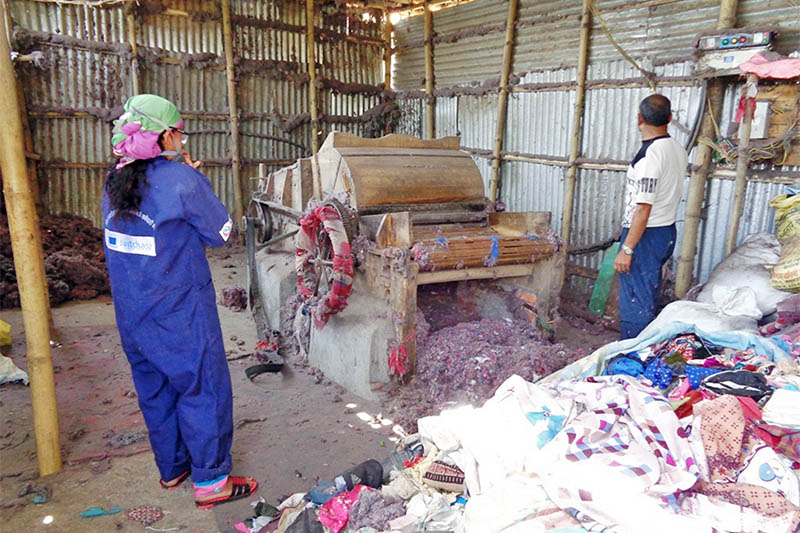Daily wagers bear the brunt of lockdown, govt fails to provide reprieve
Kathmandu, March 26
Santosh Kumar, 16, Mohan Kumar, 17, and Dipak Kumar, 16, were sitting in front of a closed shop in Kuleshwor this afternoon, fiddling with their smartphones. The three residents of Farhadawa, Rautahat, were not supposed to be hanging outside, as the government has clamped a week-long lockdown since Tuesday to prevent the spread of deadly coronavirus disease, instructing everyone to stay indoors.

“We come out every now and then to get fresh air, as the room where we live is pretty small,” said Santosh.
The Kumars came to Kathmandu around four months ago after one of the people from their village who runs a fruit shop in Kuleshwor promised them a job with a monthly salary of Rs 5,000 each. Since arriving here, all of them have been working as fruit street vendors.
“Everything was going well and we were sending home money,” said Dipak. “Then suddenly everything was locked down, rendering us jobless.” The three have not sold any fruit for the last three days. And their employer has clearly said he would not pay them during the lockdown period.
“Luckily, our employer has allowed us to stay in the room that he had rented and he gives us two meals a day,” said Santosh. Yet they are worried about being “evicted” if the lockdown prolongs. “That’s why we want to go home but we cannot do that either now,” said Santosh. Several hundred metres away from where the Kumars were hanging out, Dipak BK was sitting on the stairs of another closed shop with his back hunched. The area where the 45-year-old was seated is renowned for its fruit wholesale market, where BK works as a porter. “But with the closure of the market I barely earn anything as everything has been shut down and there is no supply of fruits,” said the resident of Ghorahi, Dang, who used to earn up to Rs 2,000 per day before the lockdown.
The father of three sons and a daughter has increasingly started feeling insecure about his future as his 19-year-old son, who used to work as a bus driver, and 16-year-old son, who used to work as a bus helper, are out of job as well. “Fortunately, I don’t have to pay house rent as I stay at my sister’s place. But I’m worried about putting food on the table,” said BK.
Lockdown was a necessity for Nepal where the healthcare system is not robust. And many have praised the government for introducing this sweeping measure. But in a country where close to 85 per cent of workers are employed in the informal sector, the shutdown will have a crippling effect on people like the Kumars and BK as they are not covered by social security.
“The lockdown should not starve thousands of daily wage earners working in informal sector,” said a press statement jointly issued today by prominent personalities, including Kalyan Shrestha, a former Supreme Court justice, Sushila Karki, former chief justice of SC, Kedar Bhakta Mathema, a renowned educationist, and Rabindra Mishra, coordinator of Sajha Party, as they called on the government to “ensure that vulnerable people don’t compromise on their living for preventive measures against the disease”.
Even India, which has large number of people working in the informal sector, has launched a $22.6-billion bailout package, which includes free food and cash transfers for those who need immediate help, according to BBC.
“It appears the government has not consulted well with experts and emulated best practices. If it starts working carelessly, it will have severe repercussions,” said economist Biswo Poudel.
But this is not the only area where the government has failed to provide reprieve. The government has failed to focus on supply chain management as well. It had called on consumers not to panic buy days before the lockdown was enforced. But three days into lockdown, people are not able to purchase grocery items, as police are not allowing shops to remain open.
Even supermarkets which were open yesterday pulled down shutters today. This shows clear lack of coordination between police and the Ministry of Industry, Commerce and Supplies, which had earlier said all outlets selling essential items, including groceries, can remain open during lockdown.
Today, the Ministry of Home Affairs, the parent body of Nepal Police, issued a statement saying food items would be delivered to houses of people residing in Kathmandu Valley soon. But it is not known how the ministry will coordinate with local bodies.
“If the supply chain is not kept intact, people will stop obeying the lockdown because everyone needs food,” said economist Poudel. “All this shows that the government had not made any preparation to deal with this issue and was hoping that the entire thing would just pass,” he added.






